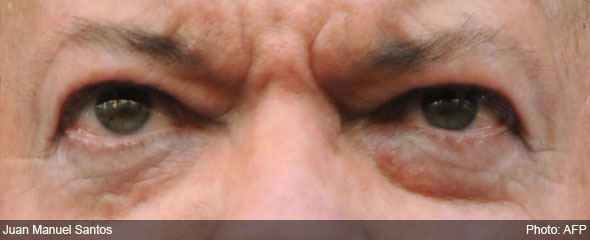
Venezuelan President Hugo Chavez on May 30 said he would be the first to congratulate the winner of the first round of Colombia’s presidential election, held that day. But when Juan Manuel Santos very convincingly won, Chavez remained quiet.
No wonder, seeing as Chavez and Santos hate each other, and with good reason. Each exposes the other for what he is; a bad politician with no diplomatic skills. They also both prefer using the other as a scapegoat to improve their domestic approval and conceal their policy failures, rather than trying to build a working relationship.
While it is commonly thought that Santos was a great defense minister, the opposite, unfortunately, is true. It was not the political decisions made by Santos that led to a string of victories against the FARC and ELN. The credit for this should go to the input of American intelligence, troops and money, and the hard work of Colombia’s soldiers. Without the help of the U.S., Colombia would be in the same position as it was in 2002. The Uribe administration continues to lobby for a continuation of Plan Colombia, because it knows that without U.S. financial and military aid, Colombia would not be able to fight an insurgency funded by the incredibly lucrative drug trade.
While Santos was defense minister, a number of huge mistakes were made because of his lack of competence. Under his watch, members of the armed forces murdered up to 2,000 Colombian civilians. In any country this would be a reason to resign ten times over, but Santos stayed. He only resigned, eventually, because he saw a chance to make a bid for the presidency of the republic.
Also under Santos’ watch, the Colombian armed forces carried out an attack on Ecuadorean soil which resulted not just in the condemnation of the international community, but also a complete isolation of the country in South America. As a result of this, Colombia stood alone in defending itself against the justified anger of Ecuador and the unjustified bullying of Chavez.
When Colombia signed a military pact with the U.S. it stood alone in defending the agreement. Washington wouldn’t get involved, and moderate governments like that of Peru and Chile refused to get their hands dirty in the defense of Colombia.
Had Colombia’s military actions been better coordinated and handled in a diplomatically clever way, Venezuela wouldn’t have been able to shut down the border, nearly nullifying the $7 billion trade between the two countries.
An example of diplomacy done correctly and cleverly is Foreign Minister Jaime Bermudez, who, despite real problems with Ecuador, knew to open a dialogue and slowly improve relations, improving the economic situation in the border region and cooperation with Ecuadorean armed forces to fight illegal armed groups and drug gangs.
One must understand that it is not Chavez’ job to protect the interests of Colombia, its people and its economy. That is the responsibility of the Colombian president and his ministers. While Uribe did a good job internationally, his defense ministers have not served the interests of the Colombians.
Because, with good relations with Venezuela (despite Chavez’s erratic behavior) the FARC could be fought from both sides of the border, while trade would flourish and the Colombian economy would be recovering a lot faster than it is now.
Santos, the man responsible for the murder of hundreds of innocent civilians, and not far removed from the scandal involving the wiretapping of journalists, Supreme Court judges and human rights workers, will be a bad representative of the country abroad and will not be able to generate the regional support Colombia needs to shut Chavez up.
All we can do is wait for the Venezuelan people to kick Chavez out of the Miraflores palace in 2012. Until then I wouldn’t expect much.

